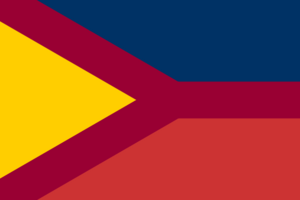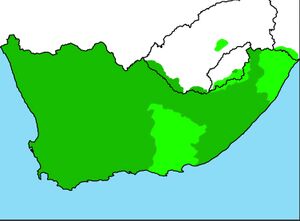Cápa: Difference between revisions
Jukethatbox (talk | contribs) No edit summary |
Jukethatbox (talk | contribs) |
||
| (5 intermediate revisions by the same user not shown) | |||
| Line 64: | Line 64: | ||
===Consonants=== | ===Consonants=== | ||
====Aspiration==== | |||
Non-click consonants do not differentiate pronunciation on aspiration, unlike in Zulu and Xhosa, where ⟨kh⟩ and ⟨k⟩ can change the meaning of a word. In Cápa, different dialects aspirate different consonants in different positions within lemmas, but the meaning of the word does not change. For example, in Stellenbosch, just east of Cape Town, all plosives are aspirated, no matter their position in a lemma(e.g. [[Help:IPA|[pʰɛ́ʃʰ]]]). In Coffee Bay, consonants are only aspirated at the beginning of a lemma, e.g. in ''bantu''("person", [bʱɐntu]), where /b/ is aspirated but /t/ is not. Additionally, in ''bantu''<nowiki>'s</nowiki> accusative form, ''ibantu'', no plosive is aspirated. | Non-click consonants do not differentiate pronunciation on aspiration, unlike in Zulu and Xhosa, where ⟨kh⟩ and ⟨k⟩ can change the meaning of a word. In Cápa, different dialects aspirate different consonants in different positions within lemmas, but the meaning of the word does not change. For example, in Stellenbosch, just east of Cape Town, all plosives are aspirated, no matter their position in a lemma(e.g. [[Help:IPA|[pʰɛ́ʃʰ]]]). In Coffee Bay, consonants are only aspirated at the beginning of a lemma, e.g. in ''bantu''("person", [bʱɐntu]), where /b/ is aspirated but /t/ is not. Additionally, in ''bantu''<nowiki>'s</nowiki> accusative form, ''ibantu'', no plosive is aspirated. | ||
Click consonants ''do'' differ on aspiration, as is the case in Zulu and Xhosa. However, in the dialect of Sehlabathebe, Lesotho, aspirated and un-aspirated click consonants switch places. So, for example, in the word ''[[Contionary:shoxoláti|shoxoláti]]'', where in standard dialects the ⟨x⟩ is unaspirated, Sehlabethebe dialect speakers(''isiSehlabétebi bantu'' in Cápa) would aspirate, and indeed, in the Cápa translation of ''[[w:The Myth of Sisyphus|The Myth of Sisyphus]]'' by [[w:Albert Camus|Albert Camus]], ''[[Contionary:shoxoláti|shoxoláti]]'' is indeed appropriately spelt ''shoxholáti''. | |||
====Click consonants==== | ====Click consonants==== | ||
Cápa, like its contemporary East Bantu languages, uses click consonants, however it only uses about two-thirds as many click consonants as Xhosa, with 12 in total, compared to Xhosa's 18 click consonants and Zulu's 15. | Cápa, like its contemporary East Bantu languages, uses click consonants, however it only uses about two-thirds as many click consonants as Xhosa, with 12 in total, compared to Xhosa's 18 click consonants and Zulu's 15. | ||
| Line 157: | Line 161: | ||
|+ Cápa personal pronouns | |+ Cápa personal pronouns | ||
|- | |- | ||
!colspan= | !colspan=3 rowspan=2| Person | ||
!colspan=2|Personal | !colspan=2|Personal | ||
!colspan=2|Post-diphthong | !colspan=2|Post-diphthong | ||
| Line 166: | Line 170: | ||
!Plural | !Plural | ||
|- | |- | ||
!colspan= | !colspan=3| 1 | ||
| ''Iu-'' || ''Noz-'' || ''-yu-'' || ''-yoz-'' | | ''Iu-'' || ''Noz-'' || ''-yu-'' || ''-yoz-'' | ||
|- | |- | ||
!colspan= | !colspan=3| 2 | ||
| ''Vu-'' || '' | | ''Vu-'' || ''Tvu-'' || ''-fu-'' || ''-tfu-'' | ||
|- | |- | ||
!colspan=2 | | !rowspan=2 | 3 | ||
!colspan=2 | M | |||
| ''E-'' || ''Ele-'' || ''-è-'' || ''-èli-'' | | ''E-'' || ''Ele-'' || ''-è-'' || ''-èli-'' | ||
|- | |- | ||
!colspan=2 | | !colspan=2 | F | ||
| ''Sa-'' || ''Ilà-'' || ''-sà-'' || ''-là-'' | | ''Sa-'' || ''Ilà-'' || ''-sà-'' || ''-là-'' | ||
|} | |} | ||
Latest revision as of 14:47, 28 November 2023
This article is a construction site. This project is currently undergoing significant construction and/or revamp. By all means, take a look around, thank you. |
| Cápa | |
|---|---|
| Kabo, isiKapa, Cape Creole | |
| isiKápa | |
 Flag of Cape State, where Cápa is natively and primarily spoken. | |
| Pronunciation | [isi.kʰɐ́pɐ] |
| Created by | Jukethatbox |
| Date | 2023 |
| Setting | Cape State, Alt-history Africa |
| Ethnicity | Nguni, Caper |
| Native speakers | 13,637,500 (2023) |
Niger-Congo-Indo-European Creole
| |
Early forms | Xhosa-Portuguese
|
Dialects |
|
| Sources | Afrikaans, Portuguese, Zulu, Xhosa, English |
| Official status | |
Official language in | Cape State |
Recognised minority language in | Lesotho, Orange-Transvaal |
| Regulated by | Ministêrio iisiKápa |
 Map of Cápa speakers.
Majority Cápa speaker community. Minority Cápa speaker community. | |
Cápa, also known as Kabo, isiKapa and/or Cape Creole(isiKápa; Cápa: [isi.kʰɐ́pɐ]), is an Afrikaans-Portuguese-English-Zulu-Xhosa creole language spoken in the area between the Orange River and the south African coast, commonly known as the Cape of Good Hope(cabo da boa esperança in Portuguese). The morphology is a mixture of primarily Portuguese and Dutch(later Afrikaans), whereas the grammar is heavily influenced by Zulu and Xhosa and the East Bantu language family as a whole.
The creole developed through the various colonisers of the South African region, and indeed, the language borrows elements from all the colonisers' languages(English, Dutch(Afrikaans), Portuguese) as well as native indigenous African languages in the area(Zulu, Xhosa).
Some more modern Portuguese loanwords derive from Brazilian Portuguese rather than European Portuguese, although in some cases both variations can be used, e.g. BP xícara and EP chávena, both meaning "cup", become shíxher(Cápa: [ʃík‖ʼɛɾ]), "cup" and sháfna(Cápa: [ʃɐ́ɸnɐ]), "glass(container)".
Phonology
Orthography
Cápa uses the 26 letters of the Latin alphabet, with tone, stress and length(of a sound) marked by diacritics. These diacritics are mostly based on the Portuguese alphabet, with ⟨á⟩ and ⟨à⟩ indicating rising and falling tone respectively, and ⟨â⟩ indicating high tone, ⟨ǎ⟩ indicating low tone and ⟨ā⟩ indicating a lengthened allophone.
Orthography for click consonants follows Xhosa orthographic convention for click consonants.
| Diacritics | |
|---|---|
| Length | ā · ē · ī · ō · ū |
| High | â · ê · î · ô · û |
| Low | ǎ · ě · ǐ · ǒ · ǔ |
| Rising | á · é · í · ó · ú |
| Falling | à · è · ì · ò · ù |
Consonants
Aspiration
Non-click consonants do not differentiate pronunciation on aspiration, unlike in Zulu and Xhosa, where ⟨kh⟩ and ⟨k⟩ can change the meaning of a word. In Cápa, different dialects aspirate different consonants in different positions within lemmas, but the meaning of the word does not change. For example, in Stellenbosch, just east of Cape Town, all plosives are aspirated, no matter their position in a lemma(e.g. [pʰɛ́ʃʰ]). In Coffee Bay, consonants are only aspirated at the beginning of a lemma, e.g. in bantu("person", [bʱɐntu]), where /b/ is aspirated but /t/ is not. Additionally, in bantu's accusative form, ibantu, no plosive is aspirated.
Click consonants do differ on aspiration, as is the case in Zulu and Xhosa. However, in the dialect of Sehlabathebe, Lesotho, aspirated and un-aspirated click consonants switch places. So, for example, in the word shoxoláti, where in standard dialects the ⟨x⟩ is unaspirated, Sehlabethebe dialect speakers(isiSehlabétebi bantu in Cápa) would aspirate, and indeed, in the Cápa translation of The Myth of Sisyphus by Albert Camus, shoxoláti is indeed appropriately spelt shoxholáti.
Click consonants
Cápa, like its contemporary East Bantu languages, uses click consonants, however it only uses about two-thirds as many click consonants as Xhosa, with 12 in total, compared to Xhosa's 18 click consonants and Zulu's 15.
| Dental/Alveolar | Post- alveolar | |||
|---|---|---|---|---|
| central | lateral | |||
| Click | tenuis/ejective | ᵏǀʼ ⟨c⟩ | ᵏǁʼ ⟨x⟩ | ᵏǃʼ ⟨q⟩ |
| aspirated | ᵏǀʰ ⟨ch⟩ | ᵏǁʰ ⟨xh⟩ | ᵏǃʰ ⟨qh⟩ | |
| slack voice | ᶢ̥ǀʱ ⟨gc⟩ | ᶢ̥ǁʱ ⟨gx⟩ | ᶢ̥ǃʱ ⟨gq⟩ | |
| nasal | ᵑǀ ⟨nc⟩ | ᵑǁ ⟨nx⟩ | ᵑǃ ⟨nq⟩ | |
/ᵏǀʼ/ is pronounced like "tut-tut" or "tsk-tsk" in English.
/ᵏǁʼ/ is pronounced like /ᵏǀʼ/ except in the same tongue position as when you pronounce /l/.
/ᵏǃʼ/ is pronounced a bit like the sound that occurs when popping a cork from a bottle, or like /ᵏǁʼ/ but in the same tongue position as /ʃ/(sh) or /ʒ/(zh).
Vowels
Prosody
Stress
Stress in Cápa is generally paroxytonic, where primary stress is placed on the penultimate syllable of a word.
Examples
Tone
Cápa, like its contemporary languages of Zulu and Xhosa, is a tonal language, with four tones- high, low, rising and falling.
| High | Low | Falling | Rising |
|---|---|---|---|
| ˥ | ˩ | ˥˩ | ˩˥ |
Phonotactics
The general syllable structure of Cápa is (C)V(V)(C), and most words, like in Zulu, end in a vowel(with the exception of some Portuguese loanwords like shíxher).
If the dipthong ⟨ai⟩, ⟨ei⟩ or ⟨oi⟩ are succeeded by a vowel, then the /i/ is palatalised and becomes /j/, which is sometimes pronounced [ʝ] in some dialects, namely in East London.
Examples:
- /ai/ + /u/ → /aju/
- A-(negative prefix) + Iubaba(I have) → Aiubaba → Ayubaba(I do not have)
- /ei/ + /e/ → /ejè/
- Ei-(near future prefix) + Eswéla(He drinks) → Eieswéla → Eyèswéla(I will drink)
Morphology
Nouns
Bagcô
Bagcô is a word that is often used in everyday use of Cápa. It can mean many things, and it originally meant "stick", possibly from Portuguese bastão. However, inexplicably, it is now often used to indicate focus in a sentence(like in Singlish/Manglish lah), but it is also used to mean "so", "also", "as well as" or even "to be fair", "to be honest" or "in [my] defense".
Although the word was originally considered slang, mainly by the upper classes in Cape Town, the word eventually seeped into their speech as well, and it is now an integral part of the language.
Pronouns
Pronouns in Cápa are prefixes to verbs, similar to grammatical structure in Zulu and Xhosa. However, the pronouns themselves are mostly based on Portuguese personal pronouns.
| Person | Personal | Post-diphthong | ||||
|---|---|---|---|---|---|---|
| Singular | Plural | Singular | Plural | |||
| 1 | Iu- | Noz- | -yu- | -yoz- | ||
| 2 | Vu- | Tvu- | -fu- | -tfu- | ||
| 3 | M | E- | Ele- | -è- | -èli- | |
| F | Sa- | Ilà- | -sà- | -là- | ||
Syntax
Constituent order
Like in English, Xhosa and Zulu, Cápa uses an SVO(subject-verb-object) constituent order structure.
Noun phrase
- Inja en kat
- dog and cat
Alternatively, the above sentence can be spelt inja enkat.
Verb phrase
Sentence phrase
Dependent clauses
Example texts
Example sentences
- Vufawa iisiPogcugéza?
- Do you speak Portuguese?
- Hi, Ayufawa iisiPogcugéza.
- No, I do not speak Portuguese.
- Bagcô, vufawa iisiXhosa?
- So/Well then, do you speak Xhosa?
- Ebo, Iufawa iisiXhosa. Bagcô isiZulu.
- Yes, I speak Xhosa. Zulu as well/also.
